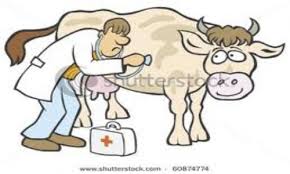
Nature of work
A veterinarian (abbreviation vet) work to safeguard the health and welfare of animals. For example, he have to handle, examine and treat all species of animals, including domestic animals, farm livestock and horses. He either work from a surgery, visit animals in their living environments, such as a farm or stables, or carry out home visits.Moreover, the veterinarian have to handle meeting , consulting with the owners and carers of various animals, including zookeepers, carrying out tests such as x-rays, blood samples and ultrasound scans, and giving advice to farmers on issues such as nutrition, breeding and herd health.
Also, a veterinarian routinely visit farms to check the health of livestock, immunize animals against different types of disease, euthanize old and terminally ill animals, provide suitable paperwork for animals travelling abroad ,and perform surgery including managing anaesthesia.
Furthermore, veterinarian is required to, insert identification microchips, maintain up-to-date records, inspect certain animal products to ensure they are safe for human consumption, as well as liaise with, and refer to, other professionals within the industry. Besides, working on out-of-hours emergency cases when on-call.
Environment of work
A veterinary must take into consideration that his working hours may be irregular, as it is important to be available for emergencies. This means that his practices offer a 24/7/365 service. This job gives him a chance to work in private practices, and being an expert can lead to buy into, or set up, a practice. Usually working conditions vary. A veterinary can work in surgeries, farms, zoos, customers' homes and other environment and he may work outdoors in poor weather conditions. He might face many difficulties during his job. For example, this career can be physically demanding, carry a high level of responsibility and be stressful. In addition, there is a physical risk of scratching and biting from animals and also a risk of catching a trans-species disease. Hopefully candidate like travelling because he may need to travel around a range of locations but travel overseas is uncommon. Professional life
A newly qualified veterinary surgeon usually work as an assistant for some time before being offered the opportunity to become a partner or a principal in a veterinary practice. However, many practices are now owned by large companies that employ vets on a salaried basis, which has decreased partnership opportunities. He might not like to become a partner because it involves increased responsibility, the need for more business and management skills and a financial input into the practice.Once working, there are opportunities to specialise in particular areas. veterinarian can do this either through existing practices or practices noted for expertise in a particular field, such as equine medicine, small animal surgery or dermatology. Entering to these specialisations needs further training, which could help getting a diploma.
A veterinarian may undertake research, teaching and academic work in universities, research institutes and pharmaceutical companies. Becoming a veterinary research needs a greater understanding of how diseases originate and spread and what effect this has on animals. Typical monthly starting salaries: from 40000 SYP
Getting the job
Applying for a veterinary position needs a degree in veterinary science/medicine and registration as a member. Degree courses are generally five years in length, six in some schools. Paying fees depends oncircumstances; therefore, it's better to check with the institutions where you intend to study..
Skills
Along with the relevant qualifications and work experience, as a candidate for university courses have to show evidence of some skills like, commitment to animal welfare, flexibility, and an ability to communicate to clients in a way that is easy to understand - especially in emotional circumstances. In addition to good organisational skills, commercial and management skills, in case candidate wish to progress to practice partner, being able to work in a practical and unsentimental way with animals, besides being caring and approachable. Sources and references
For further information we provide you with some websites to visit: www.avma.org, American Veterinary Medical Association
www.veterinarypartner.com, A series of articles on Veterinary
Arab Standard Classification of Occupations, 2008, Ed. Arab Labor Organization
